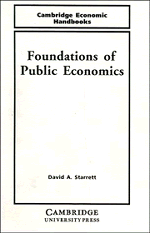Book contents
- Frontmatter
- Contents
- Preface and acknowledgments
- Notation
- PART I Scope and limitations
- PART II Decision making in a mixed economy
- PART III First-order project analysis
- 9 Decompositions and general theory of second best
- 10 Principles of shadow pricing
- 11 Local public goods
- 12 Intertemporal contexts with uncertainty
- 13 Identifying shadow values: hedonic methods and capitalization
- PART IV Evaluating large projects
- Epilog
- References
- Author index
- Subject index
11 - Local public goods
Published online by Cambridge University Press: 04 April 2011
- Frontmatter
- Contents
- Preface and acknowledgments
- Notation
- PART I Scope and limitations
- PART II Decision making in a mixed economy
- PART III First-order project analysis
- 9 Decompositions and general theory of second best
- 10 Principles of shadow pricing
- 11 Local public goods
- 12 Intertemporal contexts with uncertainty
- 13 Identifying shadow values: hedonic methods and capitalization
- PART IV Evaluating large projects
- Epilog
- References
- Author index
- Subject index
Summary
Will independent communities tend to oversupply or undersupply local public goods? Will they tend to overexpand or underexpand relative to first-best size? These questions have been debated in the literature extensively since they were first voiced by Tiebout (1956). Arguments can be given on both sides of these issues. Consider the question of size. A typical argument for underexpansion would run as follows: Local communities will tend to discourage expansionary projects because such projects encourage in-migration and increase congestion to current residents. However, the increase in congestion in a single community is not a real social cost, since congestion levels in other communities will fall as a result of the migration. Hence, local communities will be too restrictive in their provision of local public services.
On the other hand, a contrasting argument for overexpansion can be given. Communities, in attracting residents, can bid tax revenue away from others; the extra tax revenue can be used to spread the costs of a given provision of public goods more thinly over the original population. Since the additional tax revenue is a pure transfer among communities, there is a private benefit to the expanding community but no corresponding social benefit. Hence, individual communities will attempt to overexpand (and will succeed to the extent that they can attract residents).
The question of over- or under-supply to a given population depends on a different set of considerations, as we shall see.
- Type
- Chapter
- Information
- Foundations in Public Economics , pp. 175 - 190Publisher: Cambridge University PressPrint publication year: 1988



